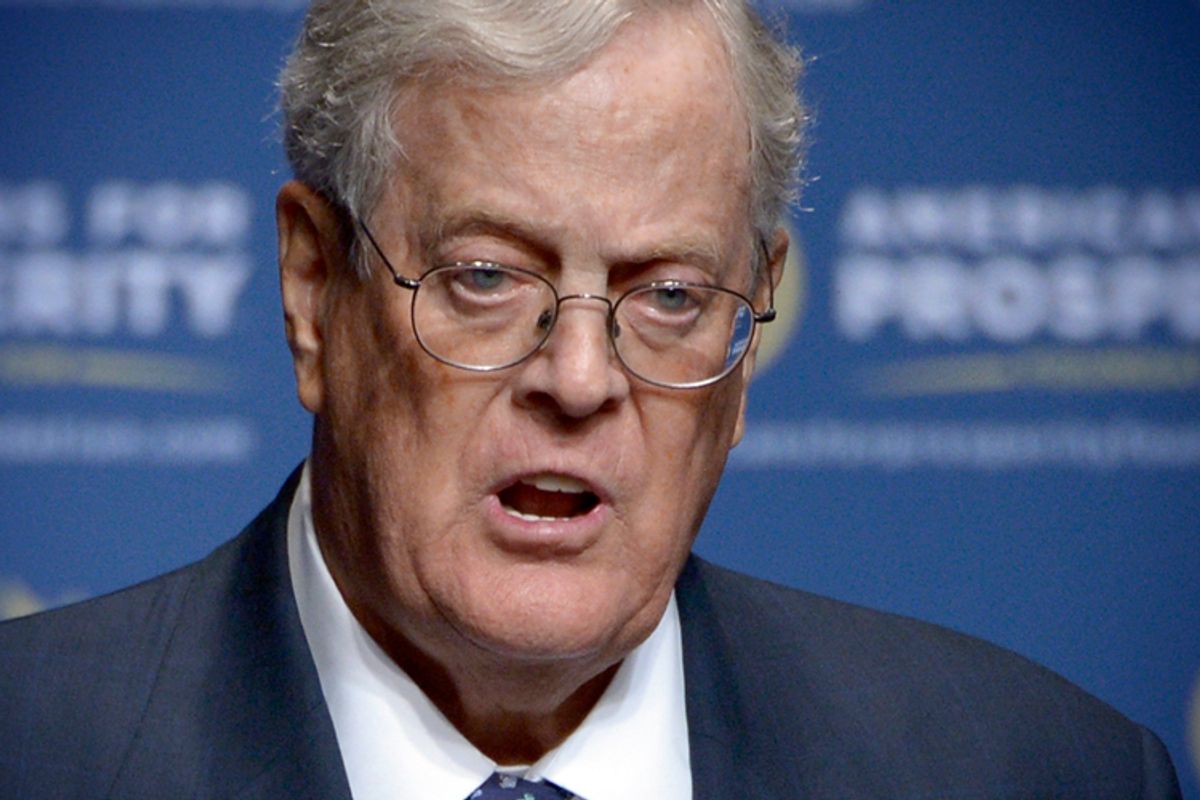Billionaire energy industry brothers Charles and David Koch are planning a 2016 campaign spending blitz that would easily eclipse previous outside political efforts, with the brothers and their political network poised to spend nearly $900 million to elect conservative candidates to Congress, the presidency, and state legislatures across the country.
The Koch network unveiled the goal Monday at the brothers' annual donor retreat in Palm Springs. The $889 million the network plans to expend far surpasses what either political party has hitherto spent in a single cycle; in 2012, the New York Times' Nick Confessore notes, the Republican National Committee and the GOP's two congressional committees spent a combined $657 million -- some 35 percent less than the Kochs intend to spend next year.
The breathtaking sum and the high-profile figures attending the summit underscore the Koch network's deep influence in Republican politics, which has been aided by the gradual loosening of campaign finance restrictions in recent years. Sens. Ted Cruz (R-TX), Marco Rubio (R-FL), and Rand Paul (R-KY) all spoke at the Kochs' Palm Springs retreat, appealing to the brothers' conservative and libertarian-minded backers for support. Two other much-discussed GOP hopefuls, Jeb Bush and Mitt Romney, did not attend.
Monday's announcement came just over five years after the Supreme Court upended campaign finance restrictions with its Citizens United decision, paving the way for unlimited political spending by outside groups.
"The Supreme Court has carved up the laws that prevent using economic might to buy political power, and the Court’s left us with a democracy where a few billionaires and millionaires are active kingmakers and the size of a citizen’s wallet determines the strength of her voice," Adam Lioz, counsel and senior advisor at Demos, told Salon. "This will be the critical legal fight of our time."
The Kochs' announcement Monday "is the legacy of Citizens United and a string of earlier cases, and we have to reverse it," Lioz added.
Although the Kochs have become the most visible faces of the growing role of money in politics, Democrats have largely made their peace with the new campaign finance regime. According to Federal Election Commission ad Internal Revenue Service figures, the 100 largest donors of the 2014 midterms gave $174 million to Democratic candidates and outside groups, compared with $100 million to Republicans and allied organizations. However, those figures do not include contributions to political non-profits, a key part of the Koch apparatus; the non-profits aren't required to disclose their donors. Such groups skew overwhelmingly Republican, according to the Center for Responsive Politics.
The Kochs' 2016 plans, which set the stage for the most expensive campaign in U.S. history, come as advocates hope to transform the public debate over campaign finance. While liberal groups and Democrats like then-Senate Majority Leader Harry Reid railed against Koch spending in the 2014 midterms, their attacks failed to resonate with most voters, particularly so-called drop-off voters the Democrats needed to turn out. Lioz hopes to change that, in part by highlighting how the outsize influence of a few wealthy donors affects issues voters care about.
"In order to talk to voters effectively about issues like the economy, the kind of education their kids are getting, that it’s really helping folks to first start acknowledging the problems we have in DC with special interests and all the money that’s flowing in," he said, citing movements to incentivize small donors and amend the Constitution to overturn Citizens United as hopeful signs for reform advocates.
Motivating voters to care about campaign finance has long been a "challenge," Lioz acknowledged, "because it’s a process issue in some ways. But what we’re seeing now is that people are connecting the fact that the process is broken to the fact that they’re being left on the sidelines and their needs are not being met."

Shares